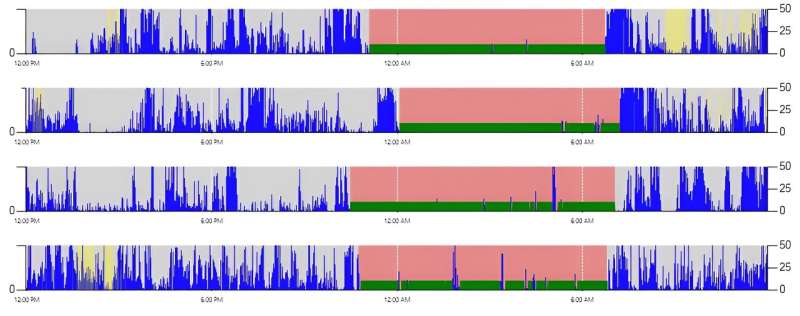This article has been reviewed according to Science X's editorial process and policies. Editors have highlighted the following attributes while ensuring the content's credibility:
fact-checked
peer-reviewed publication
trusted source
proofread
Shortening sleep time increases diabetes risk in women, finds study

A new study at Columbia University has found that shortening sleep by just 90 minutes for six weeks increased insulin resistance in women who are accustomed to getting adequate sleep. The effect was even more pronounced in postmenopausal women.
The study, "Chronic Insufficient Sleep in Women Impairs Insulin Sensitivity Independent of Adiposity Changes: Results of a Randomized Trial," was published on Nov. 13 in Diabetes Care.
The recommended amount of sleep for optimal health is between seven and nine hours per night, yet about one-third of Americans get less than the minimum recommended amount.
The findings are the first to show that a mild sleep deficit, maintained for six weeks, causes changes in the body that raise the risk of developing diabetes in women. Previous trials showing the adverse impact on insulin sensitivity included mostly men and focused on the effects of very severe sleep restriction over a short period of time.
Women and sleep
The new study looked at women in particular because studies suggest that poor sleep may have a greater impact on women's cardiometabolic health than men's.
"Throughout their lifespan, women face many changes in their sleep habits due to childbearing, child-rearing, and menopause," says study leader Marie-Pierre St-Onge, Ph.D., associate professor of nutritional medicine and director of the Center of Excellence for Sleep and Circadian Research at Columbia University Vagelos College of Physicians and Surgeons. "And more women than men have the perception they aren't getting enough sleep."
Studying the health impacts of chronic sleep loss is difficult. Some studies, performed in a laboratory setting, have shown that a brief period of total or partial sleep deprivation impairs glucose metabolism. But such studies do not reflect the typical experience of being mildly sleep-deprived, which means getting by on roughly six hours of sleep for long periods of time.
Study design
To look at the impact of mild, chronic sleep deprivation, the researchers enrolled 38 healthy women, including 11 postmenopausal women, who routinely slept at least seven hours each night.
In the study, the participants underwent two study phases in random order. In one phase, they were asked to maintain their adequate sleep; in the other, they were asked to delay their bedtime for an hour and a half, shortening their total sleep time to around six hours. Each of these phases lasted for six weeks.
Remarkably, all of the study participants were able to reduce their nightly sleep duration during the arduous six-week sleep-restriction phase. Compliance with sleep schedules was measured with wearable devices. Throughout the study, the researchers measured insulin, glucose, and body fat.
Study results
The study found that curtailing sleep by 90 minutes for six weeks increased fasting insulin levels by over 12% overall and by more than 15% among premenopausal women.
Insulin resistance increased by nearly 15% overall and by more than 20% among postmenopausal women. Average blood sugar levels remained stable for all participants throughout the study.
"Over a longer period of time, ongoing stress on insulin-producing cells could cause them to fail, eventually leading to type 2 diabetes," St-Onge says.
Although increased abdominal fat is a key driver of insulin resistance, the researchers found that the effects of sleep loss on insulin resistance were not due to increases in fat.
"The fact that we saw these results independent of any changes in body fat, which is a known risk factor for type 2 diabetes, speaks to the impact of mild sleep reduction on insulin-producing cells and metabolism," St-Onge says.
"The bottom line is that getting adequate sleep each night may lead to better blood sugar control and reduced risk for type 2 diabetes, especially among postmenopausal women."
In recent years, epidemiological studies have suggested that people whose sleep varies from day to day also have a higher risk of developing diabetes. St-Onge and colleagues will look at whether stabilizing sleep patterns among people with variable sleep schedules improves blood sugar control. Additional studies will look at whether restoring sleep for people who routinely don't get enough may improve glucose metabolism.
More information: Chronic Insufficient Sleep in Women Impairs Insulin Sensitivity Independent of Adiposity Changes: Results of a Randomized Trial, Diabetes Care (2023). DOI: 10.2337/dc23-1156




















